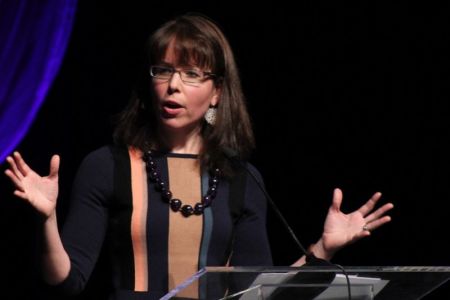Young Evangelicals Have Inherited 'Narrow Understanding' of Christianity, Molly Worthen Says

GRAPEVINE, Texas — University of North Carolina history professor and Christian author Molly Worthen told administrators from over 130 Christian colleges Wednesday that many young evangelicals haven't been taught the historical context of what it means to be "evangelical" in an era when the term has been given such a political connotation.
Worthen, whose research focuses on North American religious and intellectual history and is the author of the 2013 book Apostles of Reason, spoke at the Council for Christian Colleges and Universities International Forum, a conference held once every four years, at the Gaylord Texan Convention Center.
At a time when the common social understanding of the term "evangelical" has become linked with conservative white evangelicals and their strong support of President Donald Trump, Worthen said every week she is seemingly reading articles about how "unprecedented numbers of young people [are] leaving the church in droves" as "all these talking heads [who are] pronouncing the label evangelicalism" have "corrupted and politicized" the word too much for it to be "useful."
"So often, all of this is tied to the outcome of the last presidential election," Worthen said. "Don't get me wrong, the 2016 election was a moment of historical significance. But I think that our current political situation has effectively shed more light on a longstanding debate and divide among evangelicals and a struggle of Christian educators to prepare students for modern challenges that goes back at least a half century."
According to Worthen, students looking to attend Christian colleges today are much different from the types of students who attended Christian and evangelical higher education institutions in the 1940s and 1950s.
"The thing they seek more than anything and the thing that causes them anxiety is not really a quest for the perfect, watertight, rational case for believing the Bible. Certainly, there are some students who are preoccupied with these traditional questions of apologetics," Worthen contended. "I think the thing they really crave — and it's the same thing most of my students at [North] Carolina crave — is a sense of authenticity, a sense of knowing who they truly are in the world, of being part of a human and humane community that is rooted in place and time and can occasionally persuade them to put down their smartphones and interact as real, living, breathing individuals."
Worthen argues that the best thing Christian colleges can do for these types of students is to "give them a sense of their own history of where they stand in the broad sweep of Christianity."
Worthen explained that although evangelicals in America span an "incredible diversity of conservative Protestantism," it is the "Moral Majority flavor of the evangelical being" that has become the culturally dominant depiction of evangelicals in the United States. Such a depiction is causing some young evangelicals to wonder if they want to continue being associated with the evangelical label.
On Thursday, Worthen will elaborate further on her comments in a breakout session in which she will detail how other types of evangelical traditions in the U.S. are working to push back against the "dominant" perception of evangelicalism and how other strands of evangelicalism are working to "carve out a different relationship with secular, post-Christian society."
In her Wednesday remarks, Worthen proclaimed that she believes the study of Church history has "a huge role to play" in the future of Christian higher education.
"My impression is that on many campuses, the quest for historical consciousness is experiencing a renaissance. There is a new generation of faculty and administrators who want to rid themselves of the long duree of Christian history and transmit a sense of that to their students," Worthen said. "Students are hungry for it, especially the huge numbers that grew up in non-denominational or denominationally indifferent churches with a sort of applied myth that all there is to Christian history is Jesus and the Apostles, the papist dark ages, that Martin Luther guy, and the founding of their own church when [the pastor] started holding Bible studies in a living room over 20 years ago or whatever it might be."
Worthen said Christian students need to be taught evangelicalism's "longer, much more complicated history" so that they know they don't have to hold the exact same political opinions that today's prominent conservative evangelical leaders, such as a Franklin Graham or a Jerry Falwell Jr., hold.
"[This] can give students the tools to see how varied and rich evangelicalism really is, to see these supposedly unprecedented challenges — a post-Christian society — in a richer context and to see if they object to this or that particular self-appointed evangelical spokesperson and that no single person can speak for the whole tradition," she explained. "It's far too messy."
"If you grasp the breadth of evangelical history, if you ever just get a taste of it, you quickly start to see that the labels of conservative and progressive fall apart," she continued. "There are standards other than the political checkboxes of 2018 for thinking about faith and evaluating faith's relationship to a pluralistic culture."
Worthen concluded that today's young evangelicals and Christians are not truly looking to leave their faith.
"In fact, they really want to stay," Worthen asserted. "The trouble is that they have so often inherited a pinched, narrow understanding of what Christianity is."





















